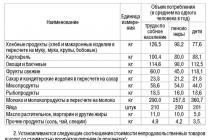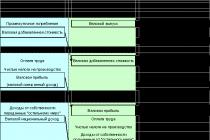Is it safer to store valuables in a bank than at home?
According to the statistics of the Ministry of Internal Affairs, major burglaries account for about 25% of the total number of crimes.
Residents suffer the most from thieves apartment buildings large metropolitan areas, as neighbors here often do not know each other. Moreover, not only wealthy people become victims, but also pensioners or families with low incomes.
37% of all thefts occur in the spring and summer, when people go on vacation, leaving their homes unattended.
Keeping your valuables in a safe deposit box will protect your valuables not only from thieves, but also from fire and flood - the bank has a storage regime that takes into account fire safety requirements. This is especially true for documents and cash. And in case of an unexpected natural disaster the bank will do everything possible to save the values of customers.
What can't be stored in safes?
It is prohibited to store in individual bank safes explosive, flammable, toxic, radioactive, narcotic and other substances that can have a harmful effect on humans and the environment, firearms, ammunition and property seized from civil circulation in accordance with the law Russian Federation.
How to renew a safe deposit box rental agreement?
For renewal lease agreements contact the bank office where the safe was rented. If you are a representative of the tenant, bring a notarized power of attorney with you.
Please note: the safe for which the paid rental period has ended will be opened by the bank commission 20 days after the end of the period. If the tenant (or his representative) turns up during these 20 days, he will be required to pay the days of overdue rent.
How to access the safe
Use the safe any day the bank is open. Access to the safe is open during the day, except for the first and last 30 minutes of the office.
To access the safe, show:
- key,
- card for the right to use the safe,
- identity document (from the rental agreement),
- my debit card Sberbank: optional, but will save time.
In what cases can the bank refuse access to the safe?
The representative will not have access to the safe until the verification of the power of attorney by Sberbank is completed. Verification takes up to 2 business days, not counting the day the power of attorney is submitted. Until the verification of the power of attorney is completed, the bank may refuse access to the safe:
- if the powers of the tenant's representative are not formalized in accordance with the requirements specified in the lease agreement;
- if there is information about the termination of the power of attorney or signs of its forgery, erasures, unspecified corrections are found;
- if the power of attorney for the disposal of property does not stipulate the actions of the representative when renting the safe.
How to issue a power of attorney for those who live abroad?
Powers of attorney of citizens of Russia, foreign citizens and stateless persons residing abroad can be certified by the authorized bodies of the country of residence (with subsequent legalization in the consular institution of the Russian Federation, unless otherwise provided by international treaties that abolish consular legalization), or consular institutions of the Russian Federation.
The power of attorney can be legalized in the consular office of the Russian Federation on the territory of the state where it was issued, or directly in the Russian Federation.
For which countries do not need to legalize a power of attorney at the Russian consulate?
You do not need to legalize the power of attorney at the Russian consulate if you issued it in the countries participating in the Hague Convention or the Minsk Convention. For member countries of the Hague Convention, the power of attorney must contain a special identification inscription (apostille).
Do I need a translation for a power of attorney in a foreign language?
For a power of attorney in a foreign language, a translation into Russian is required, including the names of the officials who signed the document and the seal (if any). The translation should be placed on one page with the text of the power of attorney, separated by a vertical bar, or on a separate sheet. The translation must be certified by the translator's signature.
The translation on a separate sheet is affixed (stapled) with the power of attorney, and at the place of affixing the notary puts a seal and signature to certify the translator's signature.
Features of drawing up powers of attorney under joint lease agreements
Under joint lease agreements, any of the tenants can issue a notarized power of attorney and grant the right to extend and / or terminate the lease agreement, replace the rented individual safe with a safe in another bank division to any other client specified in the agreement.
It is not possible to issue a power of attorney to someone else under a joint lease agreement.
What happens to the valuables if the lease of the safe is not extended?
The bank commission will open the safe 20 days after the end of the lease, draw up an act on the opening of the safe and an inventory of the items found, if any. The items will be placed in a bag, which will be sealed and sent to the bank vault. The tenant or his representative will need to write an application for the issuance of the seized items and reimburse the costs of restoring the working condition of the safe.
Cell sizes vary and depend on the type of equipment installed in the department. The width of all cells is about 25-30 cm. The depth is from 30 to 60 cm. The volume of the cell depends significantly on its height. In our bank you can rent
For example, bills of 1000 rubles fit:
- In a small cell with a size of 6.5 * 24 * 33 up to 3 million rubles.
- In an average cell with a size of 11.0 * 24 * 33 up to 5.4 million rubles.
- In a large cell with a size of 21.2 * 24 * 33 up to 9 million rubles.
- In a large cell with a size of 25.6 * 30.5 * 38 up to 20 million rubles.
How often and at what time can I visit the safe deposit box? If I urgently need to receive attachments from a cell, can I do it?
You may visit the box as often as you like during depository opening hours. You can get acquainted with the list of depositories and opening hours on the bank's website or in the Information Center.
Why does the bank take a deposit for the key?
If you have lost the key to the cell, the bank needs to order a duplicate key or change the lock along with the keys. Therefore, each such case leads to bank expenses. If you return the key to the bank, the deposit will be returned to you in full. If the key is lost or broken, the bank uses the amount of the deposit to cover the costs.
What needs to be done so that another person has access to the cell?
You can issue a bank or notarized power of attorney for a relative, for an employee of your company or for another person whom you trust with access to the box. Registration of a bank power of attorney at a bank branch is free of charge.
What will happen to the deposit in the safe deposit box if I fall ill or go on a long trip and cannot contact the bank in time to renew the lease?
According to the terms of the cell lease agreement, the client is obliged within 30 calendar days from the moment of the expiration of the period established by the contract, release the cell from the investment items. Otherwise, the bank has the right to unilaterally refuse to fulfill obligations, open the cell and withdraw its contents by issuing an appropriate act.
To prevent this from happening, you can:
- extend the contract in advance;
- issue a power of attorney for the person who will take the investment items from the cell;
- contact the bank using the chat in the Internet Bank, mobile application Raiffeisen-Online or call the Information Center to renew the lease agreement.
To questions about whether a credit institution can accept a power of attorney for the right to use a client’s safe deposit box from a third party and whether it must certify the power of attorney of a client’s representative to receive Money Pavel Yerin and Aleksey Aleksandrov, experts of the GARANT Legal Consulting Service, answer from the deposit account.
1. A credit institution has entered into a bank cell lease agreement with an individual. Can a credit institution accept a power of attorney in a simple written form to grant the right to use a safe deposit box to a third party, or is such a power of attorney subject to notarization?
2. Previously, paragraph 4 of Art. 185 of the Civil Code of the Russian Federation provided that a power of attorney for a representative of a citizen to receive his deposit in a bank or funds from him bank account can be certified by the bank free of charge. Is it possible today for a bank to certify a citizen's power of attorney to perform any actions, including those related to receiving funds on a deposit?
1. Paragraph 1 of Art. 185.1 of the Civil Code of the Russian Federation provides that a power of attorney for transactions requiring a notarial form, for filing applications for state registration rights or transactions, as well as the disposal of rights registered in state registers must be notarized, except for cases statutory. The powers of attorney listed in paragraph 2 of the same article are equated to notarized ones. Within the meaning of Art. 185, 185.1 of the Civil Code of the Russian Federation, all powers of attorney that do not require notarization can be drawn up in a simple written form.
According to paragraph 5 of the third part of Art. 5 federal law dated 02.12.1990 N 395-I "On banks and banking"A credit institution is entitled to carry out transactions on leasing to individuals and legal entities special premises or safes located in them for storing documents and valuables.
The rules of Art. 922 of the Civil Code of the Russian Federation on the agreement for the storage of valuables in an individual bank safe. The rules of the Civil Code of the Russian Federation on a lease agreement (Clause 4, Article 922 of the Civil Code of the Russian Federation) apply to an agreement on providing a bank safe for use by another person without the bank's liability for the contents of the safe.
However, neither the provisions of Chapter 47 "Storage" nor the rules of the Civil Code of the Russian Federation on a lease agreement provide for the specifics of certifying a power of attorney to represent the interests of the tenant or bailor in relations with the bank when concluding an agreement for the storage of valuables in an individual bank safe or renting such a safe, in particular, they do not require her notarization. Therefore, representation in such relations can be carried out on the basis of a power of attorney drawn up in a simple written form, unless otherwise provided by agreement of the parties.
At the same time, the bank is not deprived of the opportunity to take measures that condition the representative's access to the valuables stored in the safe deposit box, not only by the presence of a power of attorney. In particular, in the lease agreement, similarly to the rules of paragraph 1 of Art. 922 of the Civil Code of the Russian Federation on an agreement for the storage of valuables in an individual bank safe, access to a safe deposit box can be provided for by any person if there is a key, requirements are established for a document certifying the right to access to a safe deposit box, etc.
2. Indeed, paragraph 4 of Art. 185 of the Civil Code of the Russian Federation, as amended, in force until 09/01/2013, provided that a power of attorney for a representative of a citizen to receive his deposit in a bank, funds from his bank account, can be certified by the bank. Such a power of attorney is certified free of charge.
AT the current edition Civil Code of the Russian Federation, the procedure for certifying a power of attorney is provided for in Art. 185.1. The norms of this article do not mention the possibility of a bank certifying a citizen's power of attorney to perform any actions, including those related to receiving funds on a deposit. Paragraph two of paragraph 3 of Art. 185 of the Civil Code of the Russian Federation establishes that a written authorization for a representative of a citizen to receive his deposit in a bank, to deposit funds into his deposit account, to carry out operations on his bank account, including the receipt of funds from his bank account, may be represented by the represented directly to the bank. In our opinion, this rule is consistent with the first paragraph of the same article, according to which a written authorization to conclude a transaction by a representative can be presented by the represented person directly to the relevant third party, who has the right to verify the identity of the represented person and make a note about this on the document confirming the authority of the representative. Since a written authorization for representation before third parties is a power of attorney (clause 1, article 185 of the Civil Code of the Russian Federation), the foregoing means, in particular, that a citizen who has concluded an agreement bank deposit, has the right to submit a power of attorney to the bank indicating the authority of the representative to receive funds from the deposit account. The bank that accepted this power of attorney has the right (but is not obliged) to make a note on the power of attorney about the identity of the representative, which, in our opinion, is not equivalent to a power of attorney, since the rules of the Civil Code of the Russian Federation do not indicate that such a power of attorney has no legal force if the mentioned mark is not affixed.
The texts of the documents mentioned in the experts' response can be found in the reference legal system
Last update: 10/24/2019
How is it happening transfer of money for an apartment (payment method) depends on the type of market where we buy or sell an apartment.
Payments for an apartment through a letter of credit
Letter of credit- this is banking service, which is the bank's obligation, on behalf of the client, to make a payment from the client's account to the specified person ( recipient) upon presentation of the agreed documents.
The essence is the same as safe deposit box, but in the cell the calculation cash, and here - non-cash .
 The bank in which the Buyer opens a letter of credit is called issuing bank
.
The bank in which the Buyer opens a letter of credit is called issuing bank
.
The bank that will issue money to the Seller is called executing bank (may be the same bank as the issuer).
The provision by the Seller of documents confirming the sale of the apartment and the transfer of ownership is called - method of execution of a letter of credit .
Letter of credit may be covered (deposited) or uncovered (guaranteed). In the first case issuing bank actually transfers money to the account executing bank , and in the second case, the money is stored in the account issuing bank until the moment execution of a letter of credit .
Letter of credit can also be revocable or irrevocable . Here we are talking about random opportunity issuing bank revoke letter of credit from executing bank .
In practice, settlements through a letter of credit are most often used covered irrevocable letter of credit. It is this kind of it that allows to take into account the interests of the Seller, the Buyer, and the bank to the greatest extent.
♦ Sequence of actions when paying through a letter of credit ♦
However, settlements through a letter of credit on the secondary market real estate have a number of difficulties (compared to settlements through a bank cell):
- big number of documents for a bank when opening a letter of credit;
- More high price such a service, compared to renting a cell;
- Large time expenditure for the preparation of settlements through a letter of credit;
- small number of banks providing letter of credit service;
- This service is ordered quite rarely, so work fine few people can with her;
- Additional bank commissions , incl. for cashing out money from the account ( for the Seller - recipient of money);
- Possible difficulties for the Buyer when returning money in case of failure of the transaction . The executing bank may freeze the funds on its account and return them to the Buyer after a lengthy investigation, incl. judicial.
As in the case with settlements through a bank cell, the executing bank is not responsible for the authenticity of the documents provided by the Seller. In addition, the bank is obliged to report large transactions to the tax office, which is not very pleasing to the participants in the transactions.
And the most important thing settlements through a letter of credit practically impossible with « alternative deals» , of which there are many on the market.
Because of these inconveniences, and also because of the popular love of cash, letter of credit in transactions for the sale of apartments is used extremely rarely. And in the primary housing market, instead of a letter of credit, they use a very similar settlement tool - ( more about them - at the link).
Settlements in a mortgage loan transaction
If the Buyer takes , then the form of payment may differ slightly from those described above, because still taking part creditor bank .
Depending on the creditor bank , money for the apartment can be transferred to the Seller as in cash (through the cell general rule ), and transferred to the account of the Seller by bank transfer (here the bank personally agrees with the Seller on the terms of the transfer).
In case of cell, the creditor bank may require the Seller to provide additional securities for cell access with money. For example, Extract from USRN, receipt for money for the sold apartment, a receipt from Rosreestr on acceptance of a package of documents for registration, etc.
"REALTOR'S SECRETS":
A detailed algorithm of actions when buying and selling an apartment is presented in an interactive map. It will open in a pop-up window."> STEP-BY-STEP INSTRUCTIONS (will open in a pop-up window).
Comfortable:
- A wide network of bank branches providing a safe deposit box rental service;
- The ability to use the safe at a convenient time for you (during the days and hours of the bank);
- The possibility of granting the right to use the safe to a trusted person;
- The possibility of granting access to the safe to third parties together with the client or with his authorized representative;
- Provision of equipment for counting and verifying the authenticity of money;
- Opportunity to choose the lease term: from 1 day to 3 years (with the possibility of extension);
- Possibility to choose the size of the safe: width from 31 to 62 cm, height from 4 to 60 cm.
- Possibility of using an inner container in which it will be convenient for you to store valuables and documents (depends on the design of the safe)
Reliable and safe:
- Complete confidentiality of investments in the safe - only you have information about the contents of the rented safe;
- The vaults are equipped with modern banking equipment, a security system and fire alarms;
- Opening the safe is carried out by you together with a bank employee (a bank employee unlocks the safe using an electronic access control system or uses a mechanical key);
- You keep the key to the rented individual bank safe
Beneficial:
- lower rates when renting safes for long periods;
- no key deposit
In the safe you can store:
- jewelry, cash, securities,
- documents (property, education, business papers, etc.)
- family values, state awards, personal correspondence,
- much more*
* In individual bank safes it is forbidden to store explosive, flammable, toxic, radioactive, narcotic and other substances that can have a harmful effect on humans and the environment, firearms, ammunition and property withdrawn from civil circulation in accordance with the legislation of the Russian Federation.
The service can be used by legal entities.
The provision of services is formalized by a lease agreement, which specifies the lease term, amount rent, rights and obligations of the parties.
- lease agreements;
- act of acceptance and transfer for use of an individual safe;
- cards for the right to use the safe.
When you draw up the act of acceptance and transfer, you will receive for independent storage and use the key to the rented safe, the deposit for which Sberbank does not take.
As our tenant, you can visit the client valuables depository during the days and hours of operation of the client valuables depository by presenting a key, a card for the right to use the safe and an identity document (the details of which are indicated in the lease agreement for an individual safe).
You can grant the right to visit a rented safe to a trusted person. If you wish to visit the safe accompanied by third parties, supplementary agreement for access to an individual safe for an extended circle of people.
Please note that it is prohibited to store explosive, flammable, toxic, radioactive, narcotic and other substances that can have a harmful effect on humans and the environment, firearms, ammunition and property withdrawn from civilian circulation in accordance with the legislation of the Russian Federation.
To conclude a lease agreement for an individual safe, you will need:
- copies of constituent documents (certified by the registration authority, or by the executive body of the client, or by a notary);
- a copy of the state registration certificate (certified by the registration authority or notarized);
- a card with samples of the organization's seal and signatures of authorized persons, certified by the Sberbank of Russia or notarized.
The procedure is simplified if your organization's account is opened at a branch of Sberbank of Russia, in the vault of which you decide to rent an individual safe: at your request, copies of the specified documents will be made and certified by authorized employees of the bank.
If you are an individual entrepreneur, then to conclude a lease agreement you will need:
- a copy of the certificate of state registration of an individual as an individual entrepreneur or on entering into the Unified State Register individual entrepreneurs (certified by the registration authority or notarized);
- a card with a sample of your signature (without an imprint or with an imprint of a seal, if any), certified by Sberbank of Russia or notarized.
Payment for the rent of the safe is made by bank transfer, while the rent is paid at a time for the entire rental period. For your convenience, safe reservation is provided, which means that the selected safe will not be handed over to another client while you process the payment, and the transferred funds will go to the branch of Sberbank of Russia, in the vault of which you decided to rent the specified safe. If the account of your organization is opened in another branch of Sberbank of Russia or another credit institution, the reservation period consists of:
- 5 days provided for the receipt of funds to the account of this branch of Sberbank of Russia;
- the next 5 days (after receipt of the payment) to sign the acceptance certificate for the use of an individual safe, receive a card for the right to use the safe and a key.
If your organization's account is opened at a branch of Sberbank of Russia, in whose vault you decide to rent an individual safe, then you can start renting a safe immediately after transferring funds to pay for the service.
Taking into account the time interval for receipt of funds when paying for services by bank transfer, Sberbank of Russia provides for the start of the lease term not from the moment the lease agreement is signed, but from the moment the acceptance certificate is signed, which is beneficial and convenient for you.
You can extend the safe deposit box rental period by signing an appropriate additional agreement with the bank (without additional submission of the package of documents indicated above).
Please note that the head of the organization or the person (s) authorized by the constituent documents are allowed to access the rented individual safe without a power of attorney. It is possible to grant the right of access to the safe to other persons by issuing a power of attorney in the established paragraph 5 of Art. 185 Civil Code Russian Federation order: a power of attorney is issued signed by the head of the legal entity or another person authorized to do so by the constituent documents, and certified by the seal of the organization, while the name and location of the legal entity must correspond to their indication in the constituent documents. Individual entrepreneurs draw up powers of attorney in a notarial order.
The power of attorney must be without fail the name and address of the subdivision of Sberbank of Russia where the individual safe is rented, and the number of the safe are indicated. An exception is a power of attorney that gives the authorized person the right to conclude a lease agreement.
The power of attorney can be submitted to the bank by you or your authorized representative (in the latter case, Sberbank of Russia will verify it). When extending the lease of the safe, the power of attorney remains valid (until its expiration date). You can cancel the power of attorney by informing the bank of your decision in writing.
The service is provided by most regional banks. The exception is the Baikal and Northern territorial banks.
The automated depository of clients' valuables consists of individual safes enclosed in an armored case and equipped with a mechanism for automatic delivery of the safe to the client through the window of the client terminal. The storage is installed in an isolated room, access to which you get with the help of an individual magnetic card. Calling a rented safe is carried out by entering your individual PIN code. The safe of the automated vault is opened by you with a key.
The security of property storage in the automated storage of clients' valuables is ensured by the fact that:
- the device excludes access by the client or his confidant to other individual safes;
- call time of each safe and caller code is logged electronic system access control;
- it is possible to change the PIN-code at your request.
The provision of the service is formalized by a lease agreement for an individual safe, which specifies the lease term, the amount of the rent, the rights and obligations of the parties.
A client-legal entity submits the documents specified in the section "Rental of individual safes to legal entities".
The safe rental period is set according to your desire (from one day to three years) and can be extended.
The rent is calculated according to established bank tariffs. A convenient system of tariffs has been developed for you, which:
- differentiated depending on the size of safes;
- decrease depending on the increase in the lease term;
- allow you to rent a safe at a convenient time for you.
Having rented an individual safe, you receive a package of documents, consisting of:
- lease agreements;
When drawing up an acceptance certificate, you will receive a key and an individual magnetic card for independent storage and use, for which Sberbank does not take a deposit.
A client-legal entity pays for the service by bank transfer, and for your convenience, a safe deposit box is provided, for more information on the terms of which you can see in the section “Leasing Individual Safe Boxes to Legal Entities”.
The service is provided to participants in a real estate transaction - the buyer (s) and the seller (s) (up to 2 persons from each side). In this case, both individuals and legal entities can be participants in the transaction.
The provision of the service is formalized by a lease agreement for an individual safe, which specifies the lease term, the amount of the service fee, the conditions for allowing customers to access the safe, as well as the rights and obligations of the parties. To conclude a lease agreement, each of the clients provides Required documents specified in the sections "Rental of individual safes individuals”, “Leasing individual safes to legal entities”, respectively.
The safe rental period is set according to your desire (from one day to three years) and can be extended.
In accordance with the bank's tariffs, when renting a safe for settlements with real estate transactions, you pay the cost of rent (which depends on the size of the safe you have chosen and the lease term) and the cost of providing an individual safe for settlements with real estate transactions.
At your request, you will be provided with a technique for counting and verifying the authenticity of banknotes for an additional fee.
The service fee is paid by agreement by one of the parties to the transaction: an individual pays in cash to the bank’s cash desk, by debiting funds from a deposit available in this branch of Sberbank of Russia, or by debiting funds from an account bank card issued by Sberbank; a legal entity pays for the service in a non-cash way, while a reservation of a safe is provided, for more detailed information about the conditions of which you can see in the section “Leasing individual safes to legal entities”.
Having rented an individual safe, each participant in the transaction will receive a package of documents consisting of:
- lease agreements;
- act of acceptance and transfer for use of an individual safe.
- 2 cards for the right to use the safe (one for all buyers and all sellers).
When drawing up an acceptance certificate, one of the buyers (by agreement) will receive the key to the rented safe for self-storage.
In order to ensure the reliability of settlements, the following procedure is provided for customers visiting a rented safe:
- all clients specified in the rental agreement can visit the safe together;
- the seller is allowed to the safe after he has submitted a contract for the sale of a real estate object (the details of which are indicated in the lease agreement), registered by the territorial body of the federal executive body, on the alienation of the real estate object in favor of the buyer;
- in the event of a failed transaction, the buyer will be able to collect the settlement funds within seven business days, starting from the day following the last day of the lease, without additional payment for the specified period.
- if several sellers or buyers of a real estate object are listed among the tenants of an individual safe, then upon admission to the safe, the presence of all these sellers and / or buyers (depending on the stage of admission) is mandatory, as well as their mention in the real estate purchase and sale agreement.
Any seller or buyer may authorize a trusted person to access the vault within the current contract lease, which is described in detail in the sections “Leasing individual safes to individuals”, “Leasing individual safes to legal entities”, respectively.














